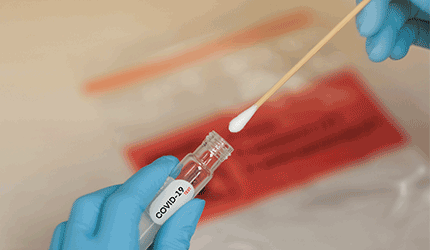In the United Kingdom, a potentially “game-changing” saliva test for COVID-19 is set to be trialed on 5,000 police and army staff after there was a growing concern over the accuracy of nasal swabs.
The test, which requires only two minutes, is thought to be more accurate than the nasal or throat swab that detects the virus.
Prof. Paul Elliott of the Imperial College London, who is leading a major government program on home testing, told the Guardian that saliva tests would be conducted on 5,000 key workers.
He said he was “very, very interested” in the potential of the tests as they are much easier to use. He also said that “clinical experiences” suggested more than 30 percent of nasal swab tests result in a false negative, leading to an incorrect diagnosis.
The UK government is in discussions with one of the US companies to get approval for its product.
Curative, a California-based medical device company, which is run by an award-winning UK scientist, has told officials it could provide at least 100,000 tests a week immediately. The company has been providing tests for the US air force. Curative said it had carried out over 300,000 tests in five states, including California and Texas.
In the United States, early studies have found the saliva test to be more accurate than the nasal swab test.
Prof. Philip Beales of the University College London Institute of Child Health described saliva tests as a “game-changer.” He said the tests could “really could get us out of this epidemiological nightmare.”
He also said that his team had found that saliva samples were “superior” to nasal swabs for detecting COVID-19.
Dr. Richard Vautrey, head of the British Medical Association’s general practitioners committee, said there have been patients with coronavirus symptoms who had repeated negative tests.
“No test is perfect, particularly when tests are self-administered and this is a particularly difficult test to do [so] there will be some false negatives,” Dr. Vautrey said. “Going on the symptoms is as good a guide as any as to what condition a patient has.” Infectious disease specialist Prof. Martin Hibberd of the London School of Hygiene and Tropical Medicine said, “False negatives could be devastating if a patient was returned to a care home and passed the disease on.”























